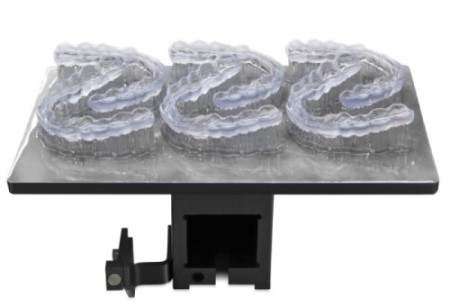Desktop Health, a healthcare business within Desktop Metal, Inc., is committed to developing 3D printing solutions for personalized medicine. On October the 7th, they announced it had received U.S. Food and Drug Administration (FDA) 510(k) clearance of SmileGuard resin, a breakthrough light-curable biocompatible material for the fabrication of strong and flexible bite splints and other orthodontic and dental appliances.
The strongest materials currently available on the market for the production of bite splints, mouth or night guards are often uncomfortable to patients. In contrast, softer materials are often not as durable. The SmileGuard resin solves this challenge. It offers a superior blend of strength and comfort, custom fitting to a patient’s specific dental profile and needs. At the same time, it has high-impact resistance to teeth grinding, clenching, temporomandibular disorders (TMD), and abrasions.
The Digital Difference
Traditional analog manufacturing night guards require dental impressions sent to a lab to produce. At the lab, a splint is thermoformed on a model, which must be created, or it’s milled out of a puck and checked on a model for fit. Then, it must be polished and shipped to the dentist, with a turnaround time often averaging 2-3 weeks and requiring multiple patient visits.
With Desktop Health’s digital 3D printing workflow, SmileGuard resin can be used to manufacture night guards in as little as an hour and delivered to the patient the same day. The patient is scanned in minutes during an office visit, where easy-to-use software enables the device to be designed and printed. Polishing takes just minutes to achieve a high shine.
3D-printed bite splints and night guards are a fast-growing segment in digital dentistry and one of the top three most common 3D-printed dental applications. More than 45% of dental labs and clinicians are 3D printing bite splints and night guards2.
“Every year, dentists and orthodontists prescribe millions1 of bite splints or night guards to prevent patients from clenching and grinding their teeth, which can cause pain, headaches, sleep disruption and also damage teeth,” said Ric Fulop, Founder and CEO of Desktop Metal. “Made with traditional techniques, these devices typically require several steps and visits – from the time to diagnose, make an impression and manufacture, to the custom-fitting to the patient. Now, dentists and orthodontists have a fast, easy and reliable way to produce custom-made devices while the patient waits at the office. This is another milestone in dental innovation.”
SmileGuard resin joins a growing portfolio of Desktop Health dental solutions for both dental labs and dental professionals, including:
- The Einstein™ 3D printer, designed specifically for dental professionals, delivers critical features essential to superior 3D printing: accuracy, speed, and versatility. Its NanoFit 385 technology delivers parts with stunning clarity, a perfect fit, and an impressive finish. Equipped with Hyperprint™ technology, which harnesses the power of heat and a closed-loop process, the Einstein prints up to 50 percent faster speed than its predecessor.
- Flexcera™ FDA-cleared materials for removable and restorative indications. This material leverages proprietary long-chain chemistry to deliver one of the strongest dental resins on the market for the fabrication of 3D-printed denture bases. Flexcera Smile Ultra+ provides the perfect blend of strength and flexibility coupled with a natural-looking, lifelike lustre for a wide range of permanent and temporary dental restorations such as crowns, inlays, onlays, bridges, veneers, full and partial dentures.
1JADA, Dental Splint Prescription Patterns: A Survey, 1995
2LMT Retrospective Survey, 2021
